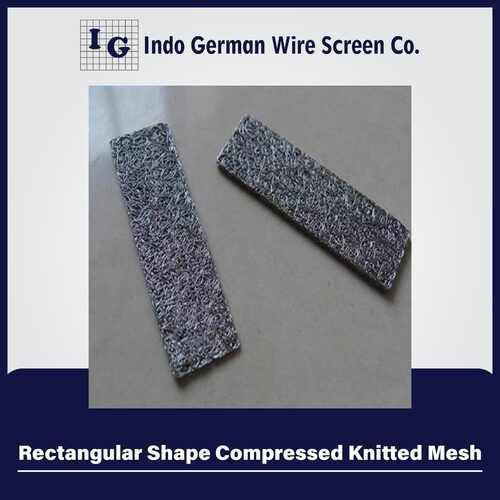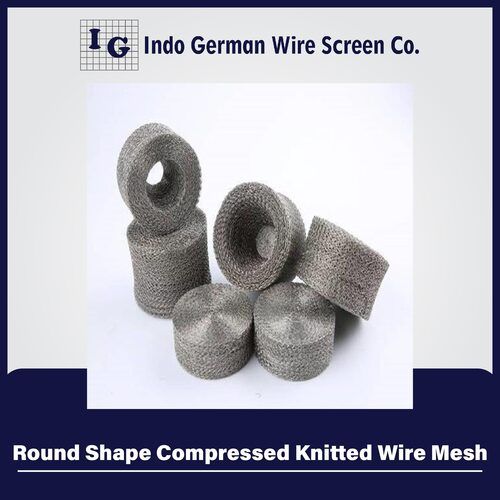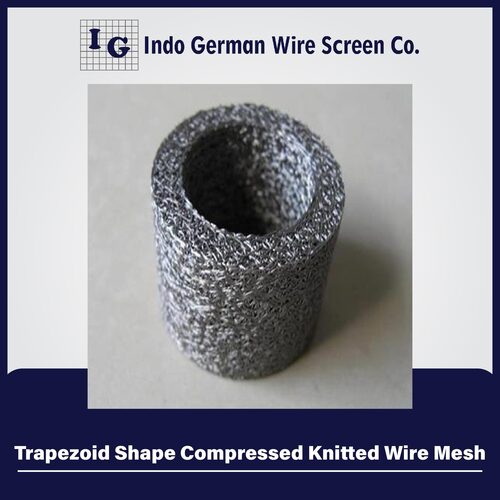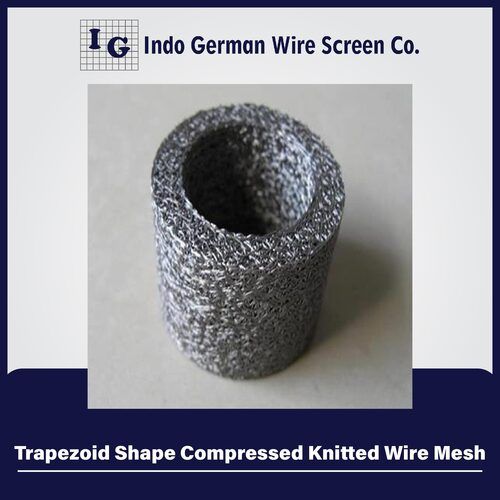Oval Shape Compressed Knitted Wire Mesh
Price 50 INR/ Unit
Oval Shape Compressed Knitted Wire Mesh Specification
- Surface Treatment
- Coated
- Hole Shape
- Oval
- Length
- Custom (typically ranges from 10 mm to 500 mm or as specified)
- Aperture
- Varies according to compression and knit (commonly 1-8 mm)
- Wire Gauge
- Custom as per requirement
- Product Type
- Wire Mesh
- Mesh Type
- Compressed Mesh
- Mesh Style
- Knitted Wire Mesh
- Material
- Metal Alloys
- Alloy
- Stainless Steel (304, 316), Monel, Copper, or as required
- Application
- Other
- Dimensions
- Available in various sizes (e.g., 40x20x6 mm, 50x30x8 mm, or as specified)
- Wire Diameter
- 0.10 mm 0.50 mm (customizable)
- Weight
- Depends on size & material; generally 10-300 grams per piece
- Color
- Silver
- Packaging Type
- Carton Box or Wooden Case
- Shape
- Oval (Compressed)
- MOQ
- 100 Pieces or as specified
- Density
- Customized as per requirement
- Operating Temperature
- Up to 600°C depending on material
- Filtration Efficiency
- Up to 99%, depending on specifications
- Usage
- Vibration Noise Reduction, Gasketing, Filtration, EMI/RFI Shielding
- Corrosion Resistance
- High (for stainless steel and special alloys)
- Edge Treatment
- Flat or Customized
Oval Shape Compressed Knitted Wire Mesh Trade Information
- Minimum Order Quantity
- 1 Unit
- Supply Ability
- 5000 Units Per Month
- Delivery Time
- 7 Days
About Oval Shape Compressed Knitted Wire Mesh
Oval Shape Compressed Knitted Wire Meshcan be used in high temperature applications and has excellent filtering capabilities. Therefore, it can be used as air and liquid filtration materials. It has a high resistance to corrosion and temperature resistance.Oval Shape Compressed Knitted Wire Meshis available in all types of alloys like Brass, Bronze, Copper, Hastelloy, Inconel, Iron, Monel, Nickel, Steel, and Stainless Steel.
We offer an exclusive range ofOval Shape Compressed Knitted Wire Meshat unmatched quality and market leading prices.
Adaptable Filtration and Sealing
This oval-shaped compressed knitted wire mesh is engineered to offer maximum versatility in industrial filtration, gasketing, vibration dampening, and electromagnetic shielding. Its oval design and compression provide superior performance in restricted spaces, making it ideal for automotive, electronic, and mechanical applications where precision and reliability are paramount.
Custom Design for Precision Applications
Every aspect of the mesh, from dimensions, wire gauge, to density, is customizable according to customer requirements. With available sizes ranging from 10 mm to 500 mm and various surface treatments, you can specify the best configuration to match unique project demands. Edge treatments are also customizable for optimal integration into your systems.
Durability and Corrosion Resistance
Constructed from high-grade stainless steel and specialty metal alloys, this mesh maintains strength and performance under harsh conditions. The product withstands temperatures up to 600C (depending on material) and offers high resistance against industrial chemicals and corrosive agents, ensuring a long operational lifespan and reduced maintenance.
FAQs of Oval Shape Compressed Knitted Wire Mesh:
Q: How is the oval-shaped compressed knitted wire mesh manufactured?
A: The mesh is made by knitting high-quality wire from selected metal alloys into cylindrical formats, which are then compressed into an oval shape. This process enhances surface area, density, and overall structural integrity. Customization is available to meet specific density, wire gauge, and dimensional requirements.Q: What are the primary applications of this knitted wire mesh?
A: The mesh is used for vibration and noise reduction, gasketing in mechanical seals, air or liquid filtration, and EMI/RFI shielding in electronic assemblies. Its robust, corrosion-resistant construction makes it suitable for automotive, aerospace, electronics, and industrial equipment.Q: When should I opt for a compressed oval shape over other mesh formats?
A: An oval compressed mesh is ideal when space constraints require a compact seal or filter, or when superior contact and absorption are necessary, such as in narrow gaskets, dampers, and shielding components. Its shape allows for a snug fit in complex assemblies.Q: Where can the oval compressed mesh be installed?
A: It can be installed in environments exposed to vibration, noise, chemicals, and high temperatures, such as engine compartments, HVAC systems, electronic enclosures, and industrial machinery. The mesh adapts to curved or irregular surfaces, offering reliable sealing and protection.Q: What is the minimum order quantity (MOQ) and how is it packaged?
A: The standard MOQ is 100 pieces, though it can be specified as per agreement. Products are securely packed in carton boxes or wooden cases to protect them during transit and storage, ensuring they arrive in optimal condition.Q: How do customization options benefit my application?
A: Customizable aspects, such as length, mesh density, wire gauge, edge treatment, and material selection, allow precise adaptation to your filtration, sealing, or shielding needs. This ensures maximum performance, longevity, and compatibility with your specific application.Q: What level of filtration efficiency and temperature resistance can I expect?
A: The mesh provides up to 99% filtration efficiency, depending on its compression and knit pattern, and withstands temperatures up to 600C, subject to the chosen alloy. This makes it reliable for critical filtration tasks and in high-temperature industrial processes.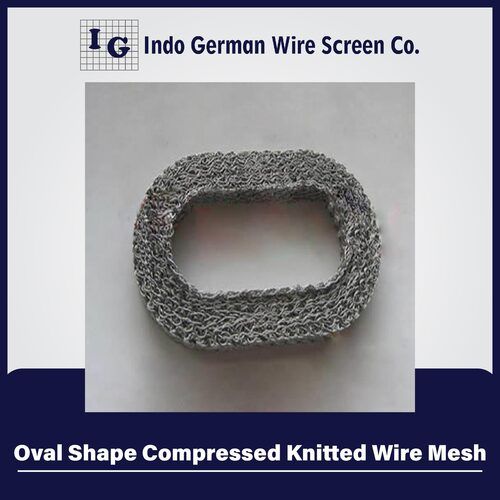

Price:
- 50
- 100
- 200
- 250
- 500
- 1000+
More Products in Compressed Knitted Wire Mesh Shapes Category
Rectangular Shape Compressed Knitted Mesh
Price 50 INR / Unit
Minimum Order Quantity : 1 Unit
Product Type : Wire Mesh
Application : Other
Material : Metal Alloys
Hole Shape : Other , Rectangular
Round Shape Compressed Knitted Wire Mesh.
Price 50 INR / Unit
Minimum Order Quantity : 1 Unit
Product Type : Wire Mesh
Application : Other
Material : Metal Alloys
Hole Shape : Other , Round
Cylinder Shape Compressed Knitted Wire Mesh
Price 50 INR / Unit
Minimum Order Quantity : 1 Unit
Product Type : Wire Mesh
Application : Other
Material : Metal Alloys
Hole Shape : Other , Cylinder
Trapezoid Shape Compressed Knitted Wire Mesh
Price 50 INR / Unit
Minimum Order Quantity : 1 Unit
Product Type : Wire Mesh
Application : Other
Material : Metal Alloys
Hole Shape : Other , Trapezoid
 |
INDO GERMAN WIRE SCREEN CO.
All Rights Reserved.(Terms of Use) Developed and Managed by Infocom Network Private Limited. |
 English
English Spanish
Spanish French
French German
German Italian
Italian Chinese (Simplified)
Chinese (Simplified) Japanese
Japanese Korean
Korean Arabic
Arabic Portuguese
Portuguese
 Send Inquiry
Send Inquiry
